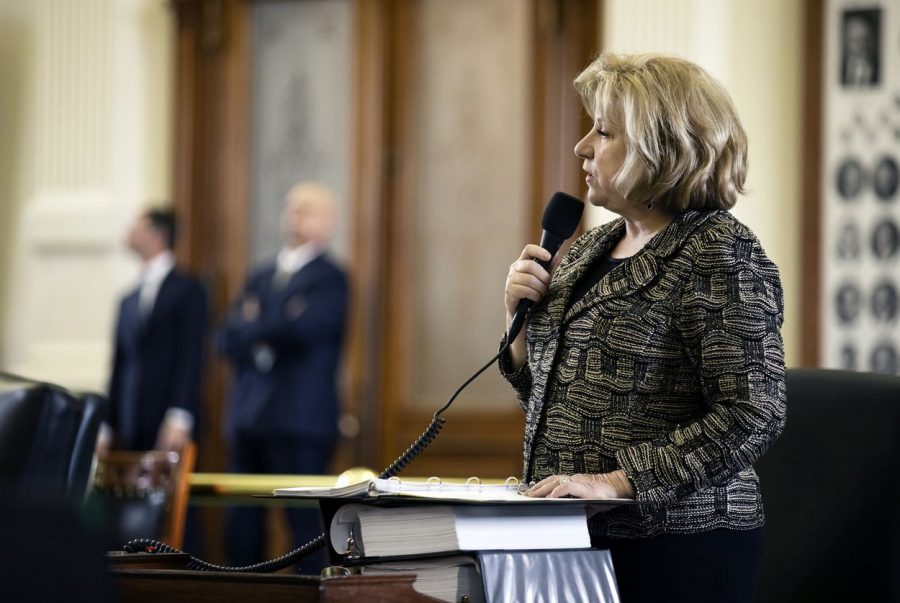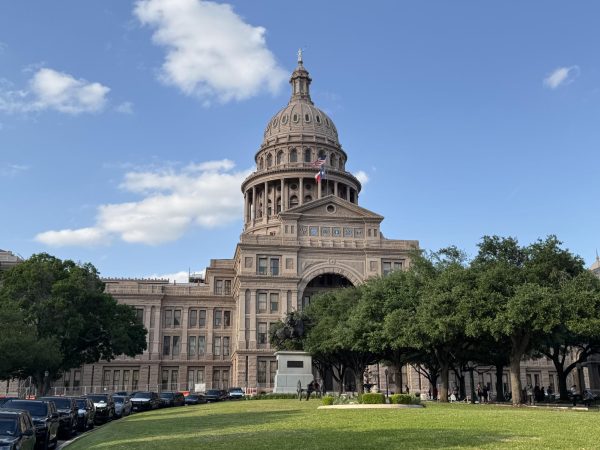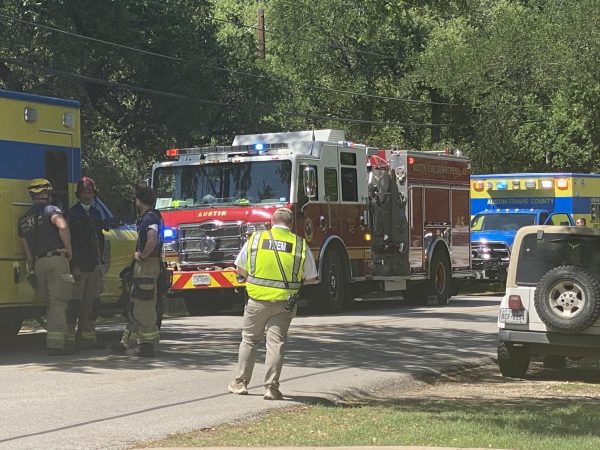Texas Senate Unanimously Passes $5,000 Teacher Pay Raises, Adding Librarians
The proposal faces an uphill climb in the lower chamber, with House Speaker Dennis Bonnen saying he prefers to give school districts flexibility on addressing teacher pay.
Miguel Gutierrez Jr./The Texas Tribune
Sen. Jane Nelson, R-Flower Mound, introduces SB 3 on the Senate.
Texas Legislature 2019
The 86th Legislature runs from Jan. 8 to May 27. From the state budget to health care to education policy — and the politics behind it all — we focus on what Texans need to know about the biennial legislative session.
The Texas Senate unanimously passed a bill Monday that would provide $5,000 annual pay raises for full-time classroom teachers and librarians at a cost of $4 billion over the next two years.
Authored by the Senate’s lead budget writer Jane Nelson, R-Flower Mound, Senate Bill 3 has been a priority of Republican Lt. Gov. Dan Patrick since he announced it at January’s inauguration. Republican Gov. Greg Abbott declared teacher pay an emergency item at his State of the State speech last month, allowing lawmakers to move more quickly to get related bills through the legislative process.
SB 3 is the first bill addressing an emergency item to be passed out of either chamber. Every member of the Senate signed onto the bill as co-author.
“We know that teachers are dipping into their own personal funds to pay for classroom supplies. Our teachers are struggling financially,” said Nelson, laying out the bill Monday. “The one thing we need to do first and foremost is to recognize the need to uplift our whole teaching profession.”
She successfully proposed an amendment to SB 3 that would add librarians to the group of educators who would receive the raise, adding $53 million to the cost of the bill.
“Librarians are teachers. … I didn’t realize that we as a state require our librarians to have spent two years in the classroom,” she said.
But she resisted efforts by Democrats, including Sen. Jose Menendez, D-San Antonio, to add other school staff such as counselors and nurses to the bill, saying it would increase the cost too much. She said school districts could decide locally to increase salaries for other staff.
State Sen. Charles Schwertner, R-Georgetown, asked Nelson whether she would support merit pay proposals to reward the most effective teachers. She indicated it would be included in a school finance reform measure that state Sen. Larry Taylor, R-Friendswood, is expected to file — Senate Bill 4.
Outside of the upper chamber, responses to the bill are mixed, with the conservative group Empower Texans, a key contributor to Patrick’s campaign, coming out against it unless lawmakers also pass “sufficient property tax relief.” And the proposal could face steep odds in the lower chamber, where House Speaker Dennis Bonnen, R-Angleton, has maintained that he would prefer to instead provide local school districts more flexibility with how they spend those funds.
In January, the day after Nelson filed SB 3, Bonnen told reporters that the state would be better off giving those districts the money to decide how to “manage their own salaries and pay their teachers there.” And last week, Bonnen told Lubbock radio host Chad Hasty that while both chambers are “committed to doing better” for Texas teachers, the House “may have a different approach than” the Senate.
Other top House Republicans have aligned with Bonnen on the issue, suggesting that a flexible block grant to help schools recruit and retain teachers would be the more thoughtful approach.
The proposal has also garnered divided responses from within the education advocacy community, with superintendents wanting more flexibility on how to use additional funding and many teachers wanting the directed raises. At a Senate Finance Committee hearing last week, educators expressed their appreciation for the bill while asking lawmakers to expand it to librarians, school counselors and support staff.
“The Legislature also must appropriate funding for pay raises for all school employees,” Noel Candelaria, president of the Texas State Teachers Association, said in a statement after SB 3 passed Monday. “Counselors, nurses, bus drivers and other support staff also are important to creating safe and healthy learning environments for Texas’ 5.4 million public school children.”
A number of House Democrats have championed expanding pay raises to other school staff, as well as addressing rising teacher health care premiums. In a plan unveiled by the House Democratic Caucus earlier this month, members proposed $3.78 billion for teacher pay and benefits. It was unclear at the time of the announcement how much would be set aside for raises.
Patrick first advocated for increased teacher pay in a 2017 special legislative session, but he wanted school districts to reallocate existing funding to pay for it. That proposal did not move far through the legislative process before getting axed when education advocates came out against it.
The bill would also cover the increased cost of teacher pension contributions for school districts as a result of the pay raises and would stop districts from decreasing the raises in future years.
Disclosure: The Texas State Teachers Association has been a financial supporter of The Texas Tribune, a nonprofit, nonpartisan news organization that is funded in part by donations from members, foundations and corporate sponsors. Financial supporters play no role in the Tribune’s journalism. Find a complete list of them here.
This story is from The Texas Tribune. The Texas Tribune is a nonprofit, nonpartisan media organization that informs Texans — and engages with them — about public policy, politics, government and statewide issues.






